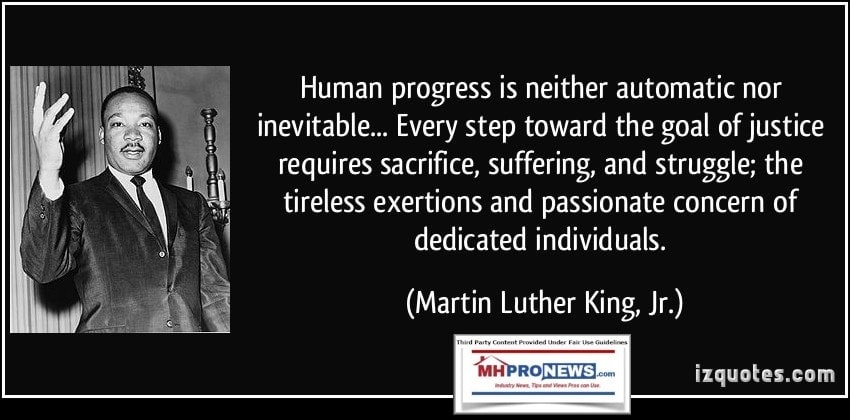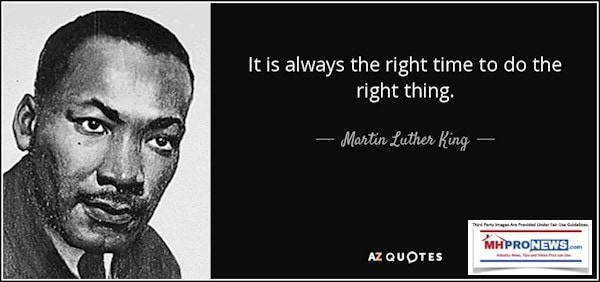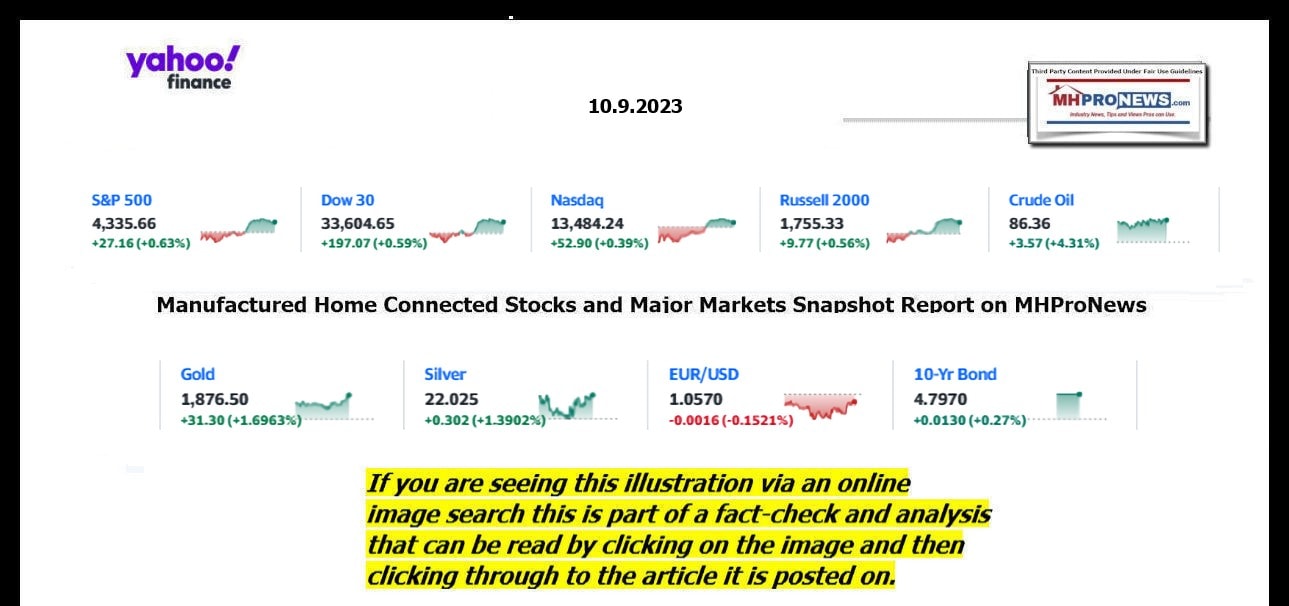
Alexandra Hudson said: “sometimes actually respecting someone, actually loving someone requires being impolite. It requires breaking the rules of politeness and propriety, having a hard conversation, an uncomfortable conversation, telling a hard truth, engaging in debate.” She said in the interview transcript below that “I am constitutionally allergic to authority.” Hudson’s interview with the Daily Signal’s Executive Editor Rob Bluey mentions ‘well mannered yet ruthless and cruel’ people she has met during her time in Washington, D.C. and beyond. It is an interesting and insightful read.
Stating the obvious can be useful. When MHProNews provides curated content for the MHVille audience it is always with some purpose in mind. We may agree, disagree, or feel ‘meh’ about some aspect of what a given source said, but the statements themselves may be useful in sparking discussion and understanding.
For example, on the issues raised by Hudson, it would be fair to say that some of our contemporaries have the notion that debate or pointed critiques are impolite. Hudson explains why they are useful and necessary. The truth is important. People can ignore reality. But the consequences of reality can’t be ignored.
While facing the consequences of reality may be delayed, it is often only done at a greater cost.
As the old maxim goes, “a stitch in time saves nine.”
Our industry and nation already need multiple stitches. So, further delays dealing with underlying issues only tends to make the costs and harms more egregious.
Part I for today’s installment of “Industry News, Tips, and Views Pros Can Use” © is an article from the Daily Signal provided with permission to MHProNews.
Part II is Additional Information with More MHProNews Analysis and Commentary
Part III is our Daily Business News on MHProNews
Part I
SOCIETY | ANALYSIS
Alexandra Hudson’s Cure for Incivility
Rob Bluey / @RobertBluey / October 10, 2023
At a time when America faces innumerable challenges, Alexandra Hudson wants her fellow citizens to focus on something only they can control: civility toward others.
Hudson’s new book, “The Soul of Civility: Timeless Principles to Heal Society and Ourselves,” is on sale today. She joins “The Daily Signal Podcast” to talk about something why civility is so lacking in our society and what to do about it.
In this era of “cancel culture,” Hudson believes it’s critical to have tough discussions and debates with our friends and neighbors—especially those with whom we disagree—but we’ve lost sight of what it means to do so in a respectful way.
Listen to the full episode or read a lightly edited transcript below. You’ll learn how to live tolerantly with others despite your differences.
Rob Bluey: Your book comes at such an important time. You told me that you hope “The Soul of Civility” helps us rediscover a common language and a common set of values. So let me ask you this, despite all of the challenges it seems that we face and the differences of opinion in our world today, why are you optimistic?
Alexandra Hudson: It’s really easy to feel like there’s a lot wrong with our current moment. Many thoughtful people remind us all the time that, why are we rude and why are we mean and why are we lonely in America? As if it’s the worst this has ever been.
I’m a student of history and history is both a caution and a comfort. On one hand, things have been really bad before in our country and in human history. Thankfully, there are not murders on the steps of the Capitol right now and we’re not in the midst of a civil war right now. On one hand, that’s a comfort, that that’s where we’ve been before as a country, but it’s also a caution as well.
So my hope is a modest hope, Rob, that civilization’s fragile, friendship is fragile, and it’s never a foregone conclusion. And I hope that my book encourages each of us to see the role that we each have in supporting this fragile and beautiful thing called our democracy and that our everyday interactions are an opportunity to enhance it or detract from it.
Bluey: You write about the difference between politeness, which you call good manners and things of that nature, and true civility. Can you explain that distinction for our audience?
Hudson: So I was raised by—her name is Judi the Manners Lady. So she’s known as very attentive to manners and social norms.
I am constitutionally allergic to authority, Rob. I don’t like being told what to do. I don’t like rules. I am triggered by bureaucracy. So I always questioned these rules of politeness my mother asked us to do. I would say, “Why do we set the table like this? Why do we use forks at all?”
But I generally follow these rules my whole life because my mother promised they would serve me well in school and in life, and they did until I got to the United States Department of Education, and there all of a sudden everything I thought I knew about the world and myself was questioned.
I saw these two extremes. On one hand, there were people with sharp elbows and they were willing to step on anyone to get ahead and they were aggressive and hostile. On the other hand, there were these people, at first I thought they were my people, Rob. They were polished and poised and polite. But this is the people that would smile at me and others one moment and stab us in the back the next.
And this really threw me because, it perplexed me, because my mother had said to me growing up that manners mattered because they were an outward extension of our inward character. And yet here I was surrounded by people who were well-mannered enough and yet ruthless and cruel.
And this clarified for me this essential distinction between civility and politeness, that it was actually possible to be polite and not be civil, actually, at all.
So politeness is manners, it’s etiquette, it’s technique, it’s behavior, it’s external, it’s superficial. Whereas civility is a disposition of the heart, it’s a way of seeing others as our moral equals who are worthy of respect just because they’re our fellow citizens, just because they’re our fellow human beings.
And that sometimes actually respecting someone, actually loving someone requires being impolite. It requires breaking the rules of politeness and propriety, having a hard conversation, an uncomfortable conversation, telling a hard truth, engaging in debate.
Those are forms of actually respecting someone as opposed to the alternative, the polite thing to do, which might be to patronize someone and pretend that a difference doesn’t exist. To sweep a conversation, to kick it down the road a little bit, to avoid the discomfort, that’s not actually respecting or loving.
So just as I learned in government, it’s possible to be polite and not civil—to do the nice things, to smile and flatter, but not actually respect people, to use them. It’s possible to be civil, to actually respect someone while being impolite, while talking about religion and politics at the dinner table, which politeness tells us not to do. We have to talk about those things sometimes, especially in a democracy.
Bluey: You shared a little bit about your background in that response, but I’d like our audience to learn a little bit more about you and what led you down this path to write the book, which we know, in talking to many authors on this program, is a massive undertaking in your own life. And as a mother, I mean, I would imagine that it required some sacrifices on your part. So walk us through your own journey and what led you to that point.
Hudson: It was impossibly hard and it’s a miracle this book exists and I’m so grateful. I’m humbled and grateful. It feels like a gift of unmerited grace that it’s here and I can’t wait to share it with you and with the world.
Everyone told me not to write it. Everyone said, “You’re not the person. This is not the time. There is no appetite for a conversation about personhood and human dignity and civility and manners in public life right now.”
One of my friends and great supporters at the Mercatus Center, Tyler Cowen, told me not to write this book. He’s like, “Writing a book is hard.” He’s like, “Don’t do it.” He said, “Only write the book if you have a disease and writing the book is the cure.” And that absolutely described my state. I couldn’t not write this book, Rob. I had to do it.
And how did I actually do it? I was up at 4:30 writing and researching and studying and praying. A lot of rejections, a lot of typing on the phone while having sick babies in my arms. I have two kids. I’m not even kidding when I say it’s a miracle that this book is done and it exists. But I couldn’t not do it. It was just not an option. And so I’m thrilled that it’s finally here.
Bluey: You mentioned earlier the role of history in all of this, and as somebody who incorporates some lessons from history in the book, tell us about some of those examples that readers can expect to learn about as they read your book.
Hudson: So, for example, recently Washington and the Hill was in a tizzy about the ousting of the speaker, right? Everyone’s like, “Whoa, what does this mean? This has never happened before.” Incivility is at a high.
And it’s true that also in recent history we’ve been having debates about dress code in Congress, the stuff of politeness, which I think is a smoke-and-mirrors thing to distract from the lack of civility in Congress right now. Our leaders are not working together across divides. They’re not respecting one another across difference. And it’s hamstringing how our institutions are able to function. It’s not serving Americans well.
So anyway, with that in the background, we’ve recently had this conversation about the lack of civility and our public life, but it has been worse.
There’s a story I love to tell. William Taulbee was a congressman in the 1890s and he had an affair with someone who was not his wife and a journalist found out, Charles Kincaid found out, wrote about it, and it was a huge scandal. Taulbee had to resign.
Taulbee never forgave Kincaid for exposing him, for doing his journalistic duty and exposing this hypocrisy and this disingenuousness from Taulbee. And for years, Taulbee harassed Kincaid. He was no longer a Congress person and Kincaid was always on the Hill, he was a Hill journalist.
And so Taulbee would stalk him. He would stalk and lay in wait for Kincaid to walk through the halls of Congress. And he would punch him, he would shove him into walls, he would berate him, curse at him, he would step on his feet. He’d literally just bullied and harassed Kincaid for a very long time. Just so angry that this journalist had ruined his career.
One day Kincaid had had enough and he went to Congress and shot Taulbee in the head, who died on the steps of Congress. And some people say that you can still see the stain of William Taulbee’s blood on the steps of Congress.
So I mean, we think that incivility is a serious issue in our world today, in America today. There have been murders in Congress before, there’ve been canings, brutality. There’s been mob violence in our country before. I think that the recent ousting of the House speaker, sure it’s unprecedented maybe in some ways, but at the same time, it could always be worse.
Again, to history being caution—it’s been bad before, it could be bad again. But also comfort. Thankfully, we’re not quite there. We think that relationships between politicians and media is bad. We don’t have members of the media shooting members of Congress or former members of Congress anymore like we have had in our nation’s past. So history is caution and comfort.
Bluey: One of the other historical references you make in the book is about Dr. Martin Luther King Jr. and his “Letter from Birmingham Jail.” And you actually cite the word soul in the title of the book, “The Soul of Civility,” is coming from that letter. Can you share with us how that played a role in your thinking about this topic?
Hudson: Thank you so much for that question, Rob. We hear a lot in our public life today from all across the political spectrum that the stakes are too high. The other side is too bad, too wrong to be reasoned with, to be decent to, to respect. That all bets are off. We have to be willing to do and say anything to get ahead and to win. And Dr. King is really a powerful antidote to that idea.
Drawing from his inspiration, I argue in my book that incivility, indecency, cruelty to another fellow human being doesn’t just hurt them. It hurts ourselves, too. It deforms our own souls, too.
So Dr. King, in his letter from a Birmingham jail, makes an argument about segregation. He says that segregation harms both the segregated and the segregator. It hurts the segregated because it gives them a false sense of inferiority. It hurts the segregator, it deforms their soul by giving them a false sense of superiority. So it’s mutually harmful to both parties. The same is true with incivility. When we hurt others, we hurt ourselves. We make ourselves less human, we damage, we deform our soul.
And in fact, Rob, this is an argument that happened during, just on the cusp of, and amid the Civil War era about slave holders in the South. People thought that owning another human being, owning a slave deformed a slave holder’s soul, it disfigured it and made them unfit for self-governance and a democracy. And that was a real debate. Could the South ever even be assimilated into America? There had to be a whole regime change and a soul change at the soulish level of individual slave holders in the South.
So anyway, Dr. King is an inspiration to me in this book and this project in many ways because just as incivility is mutually harmful, it hurts both parties, dehumanizes others, when it instrumentalizes them, when it harms them, dehumanizes them, it hurts ourselves, too. But civility, seeing the humanity and affirming the dignity of others, that is mutually ennobling. It cultivates and affirms the humanity of others and it makes us more human and more humane. It enhances our own soul, too.
Bluey: You and I have talked about different ways to go about addressing some of the challenges related to this topic. And you’ve cited that there have been some elected officials who have tried to, I think in your terms, regulate or try to impose rules to get us back to a place.
Can you explain what an example—Michael Bloomberg comes to mind, but I’m sure that there are plenty of others that you could share with our audience—and some of the challenges that may exist in a situation like that?
Hudson: Democracy depends on civility, it depends on self-governance, our ability and will as citizens to restrain our ego, our baser impulses for the sake of our fellow citizens, our fellow human beings. And we have to do that. And if we don’t, autocrats, leaders past and present will be tempted to do that for us, to regulate the bonds and regulate common courtesy, mandate common courtesy between citizens. So if we don’t want that, it depends on us to do it.
So, an example I use is Bloomberg’s politeness campaign. In the early 2000s, apparently incivility had reached a fever pitch in New York and something had to be done, some people in Bloomberg’s office thought, Bloomberg thought, so he instituted this whole politeness campaign.
If you had your seat on the subway seat next to you, meaning that someone else couldn’t sit down and use it, $50 fine. If you were texting in a movie theater, $50 fine. If you’re a parent at your child’s baseball game and you’re a little too enthusiastic, $50 fine. Just went on and on on.
Sure, these are common courtesies that help make society possible and make us want to do society together. Society’s hard. These are common courtesies that should be done, but is it the role of the government to mandate that? No. And it failed. This politeness campaign in New York absolutely failed. New Yorkers did not like being civilized by their local city government.
And it was impossible to enforce and it opened up abuse of power. If you have laws on the books that are unenforceable, we don’t want a police state where authorities are in every corner watching our every move, ensuring that we’re being decent and kind to one another. So if we don’t want that, it depends all the more on each of us to choose to do that voluntarily for the sake of, again, others, for the sake of ourselves, for the sake of a free society and a limited government.
My book, “The Soul of Civility: Timeless Principles to Heal Society and Ourselves,” pubs Oct 10, 2023! A decade’s work on how civility, rooted in human dignity, sustains our freedom. Preorder&get $700 in GIFTS! https://t.co/618MKG58mc #TheSoulOfCivility #BookLaunch2023 #Preorder pic.twitter.com/H8L3eKmCoM
— Alexandra Hudson (@LexiOHudson) August 25, 2023
Bluey: I have to ask you about the cover and the olive branch, because you shared with me, what was many weeks ago now, your thinking behind that selection and the careful selection of it. What does the olive branch symbolize and why did you choose it as the art?
Hudson: I wanted to harness the power of beauty in the cover art of my book. And so the olive branch and the cover has many layers of symbolism. I’ll share just a few aspects of that. At a very surface level, the olive branch is this universally recognized symbol of peace and friendship and reconciliation. So at a very obvious level, that is appropriate for the spirit of this project.
At a deeper level, in the Hebrew Bible, in the Book of Genesis, after God floods the earth because humanity is evil, Noah builds the ark. And then to assess whether the flood has subsided, Noah sends a dove out to go and the dove comes back with an olive branch in his mouth and that symbolizes the flood has subsided and the ark can land.
And this new birth, this new era, this new era of humanity is ushered into existence after destruction, after chaos of the flood. And I hope that my book is a tool that can foster that new era of reconciliation, of conversation, of openness, of thinking more critically about these questions than the tenets of a free society.
There’s also a lot of etymology, references to classical Greek and Roman culture, a lot of which has informed our own culture. And the olive branch is also symbolic of that, of antiquity of those two cultures.
The olive branch is also, the olive tree rather is one of the oldest cultivated crops in the world. It goes back to ancient Sumer, one of the oldest cultivated crops. And this metaphor of cultivation and the garden is really important to, the visual is really important to my book, that civilization itself is like a garden. It is not a foregone conclusion. And it takes work. It takes effort to cultivate the raw stuff of humanity, to bring forth what is best and beautiful and more abundant in each of us as individuals, but also as a society where we can truly flourish in community with one another. So that idea of cultivation and a cultivated crop is really important.
And finally, it’s a watercolor. And if you look closely, there are kind of little speckles of—and I want it to feel like an act of work of art. I want want people to look at it and feel as if the artist, that he or she had just lifted his or her brush from the canvas. And that is a metaphor for this joint project of living well with others, that it’s a work of art, it’s a cultivated work of art, but it is never complete. We’re all very much works in progress.
This project of this joint commitment to self-governance that is democracy, it’s a work in progress. It’s never complete. This, again, is homage to Dr. King as well. And that we each have a part to play in perfecting it and working toward it, perfecting ourselves and perfecting society, too.
Bluey: Beautiful answer to that question. Let me ask you a slightly more challenging one—and I’ll go back to your reference and your time working at the Department of Education and some of the encounters that you had and the personal experiences.
I recently heard Tucker Carlson in one of his interviews on X refer to tolerance as something that the Left was preaching a couple of decades ago and then it ultimately turned out that they were among the most intolerant people that exist in the world today. And he warned us, as an aside, that you hear them talking a lot about democracy today, just be fearful about what their intentions are in the years to come.
Ep. 27 Donald Trump appeared in court today, but it wasn’t a legal proceeding. It was a grotesque parody of the system our ancestors created. Victor Davis Hanson explains. pic.twitter.com/KhTHateWCZ
— Tucker Carlson (@TuckerCarlson) October 2, 2023
So I know that you hope that the book will empower people to live tolerantly among each other despite their differences. But based on your experiences, based on maybe the experience of some of our listeners, what advice can you leave them with today as they go forth and hopefully pick up a copy of your book, as they live out these principles in their own life?
Hudson: It’s such a great question, Rob. When I left Washington, D.C., and moved, I fled, fled government to Indianapolis, Indiana. I had in my mind the bucolic rolling hills and fields of the Midwest. My husband’s from here originally. I wanted to leave D.C. and it was my decision to leave. And so we moved here just after I left government in 2018.
And one of my first friends was named Joanna Taft. She came up to me after church one day and she said, “Hi, I’m Joanna Taft. Would you like to porch with us sometime?” And I had never heard the word porch used as a verb before, but I was curious and we didn’t know many people here.
So we went to her home that day and I realized that Joanna Taft was staging this quiet revolution of social and cultural healing from the vantage point of her front porch. She had curated people across race, across political divide, across geography in the city to just inhabit a shared space. There was no itinerary, no curated conversation. It was just being together as human beings in a shared space.
We’ve talked about human nature doesn’t change. It doesn’t matter the era or the location. The human condition is the human condition. We’re social yet selfish at the same time. And that is why civilization is fragile. But there are things about modern life that are different.
For example, it’s very easy to go from work to car to office and back again and not really expose ourselves to people who are different from us. It’s really easy to maintain our own little bubbles. We can get groceries and meals and every Amazon.com, God bless it, comes right to our home. If we don’t want to we don’t have to seek out exposure to people that we don’t want to be around or who are different from us. It’s uncomfortable.
But Joanna is staging a quiet revolution from the vantage of her porch against this divided and lonely and isolated, siloed status quo. And she has decided that and recognized she cannot control what is happening in Washington, D.C. She can’t control the division, the rancor, the scandal of the day, the tweet of the day. But she can control herself. And she has chosen to make her community better and her family stronger and more beautiful by controlling what she can control.
And when I was a Novak journalism fellow, I got this award to study and report on people like Joanna across the country who are doing the exact same thing, reclaiming their social and civic sphere, their power and their agency to be a part of the solution, whether or not they have a front porch.
For some people it’s a stoop in a big city or a front lawn or even a coffee shop, a public place. Some people sit there and they hold court and they just know, the community knows it’s a place where they can come into community and conversation and be seen and known and loved. And that is what is going to heal our world.
We can each have that porching disposition that wants to make the stranger the friend, that leads with our humanity and doesn’t see people by virtue of one aspect of who they are, who they voted for, what the color of their skin is. We can live our lives in a way that heals our world, that sow seeds of trust and brightness and reconciliation like Joanna Taft.
Bluey: Thank you for sharing that inspiring story. It’s so fantastic to always hear about individuals who are doing things of that nature. Alexandra Hudson is author of the book “The Soul of Civility: Timeless Principles to Heal Society and Ourselves.” The book is on sale today. Pick up a copy wherever books are sold.
Alexandra, can you share with us, as we wrap up here, how our listeners can follow your work if they want to learn more about the book or other things that you might be up to?
Hudson: Thank you. Please do consider joining me at Civic Renaissance. It’s my publication and intellectual community dedicated to beauty, goodness, and truth, and reviving the wisdom of the past to help us lead better lives. And that’s where we can continue to learn alongside one another to talk about these essential issues of the day. How might we flourish across difference. And I’d love you to consider joining me over there.
And if you buy the book, I have $700 in free gifts that I’ve created for every single person who preorders the book, orders the book, that you can get at my website, alexandraohudson.com. So thank you so much for having me, Rob, and … to your listeners for considering ordering the book.
Bluey: Absolutely. Well, we look forward to having you back on the show in the future, and thank you so much for spending the time with us today.
Hudson: Thanks, Rob. ##
Part II Additional Information with More MHProNews Analysis and Commentary
When corruption exists in government or other institutions, exposing corruption usually results in one or more egos being bruised. That bruised ego is a consequence of embarrassing revelations, but is not necessarily the goal of revealing corruption or ineptitude. To cure a problem, a problem must be understood, and then the remedial steps taken.
Mike Kapic, an AMAC.us volunteer and the author of The Hunt for Liberty, shared the following three thought-provoking quotable quotes with MHProNews which may apply to these surprising insights.
“You can ignore reality, but you cannot ignore the consequences of reality.” – Ayn Rand
“If some men are entitled by right to the products of the work of others, it means that those others are deprived of rights.” – Ayn Rand
“No one’s rights can be secured by the violation of the rights of others.” – Ayn Rand
Hudson mentioned Dr. Martin Luther King Jr. MHProNews has utilized compelling and insightful remarks from King scores of times over the years. For example.



Those are useful. Some of those insights may be inspired by God’s Word.
The case can be made that the some of the wisest words ever spoken were the Ten Commandments.
- Respect (honor) your parents.
- Do not steal or defraud.
- Do not bear false witness.
- Be faithful.
- Do not murder (i.e.: do not take innocent life).
- Have no false gods and idols, don’t have an unhealthy desire for something that is not yours, and so on.
King, Rand, and Hudson have each made fine points. But to the extent that someone’s thoughts or behavior deviates from the Divine, the case can be made that better still are the simple potent words translated from the ancient tongues that were inspired by God Himself.
Hudson said in the interview with Rob Bluey, executive editor of The Daily Signal, that: “sometimes actually respecting someone, actually loving someone requires being impolite. It requires breaking the rules of politeness and propriety, having a hard conversation, an uncomfortable conversation, telling a hard truth, engaging in debate.”
There are numerous examples in Scripture of less than polite remarks being made by a religious figure that seem to be held up for their example to be considered.
Both America and our profession are underperforming, to put it politely. There are voices on the left and right (not to say they are necessarily equal or equivalent) that say that the opposition must be crushed and beaten. Abraham Lincoln felt that winning over the opposition was far better than crushing them.

When the Civil War, or the War Between the States, ended, Lincoln wanted to heal the wounds of war. Lincoln felt the need to defeat the states that broke from the Union, but once victory was won, healing was on his mind. Some on both sides of the old Mason Dixon line didn’t like that notion.
Lincoln’s formula may be useful in MHVille. Legally defeat those who have apparently hijacked our industry’s good name, honorable services, and arguably once more honorable institutions. But as often as possible, win over those who can be persuaded by the truth.
Part III – is our Daily Business News on MHProNews stock market recap which features our business-daily at-a-glance update of over 2 dozen manufactured housing industry stocks.
This segment of the Daily Business News on MHProNews is the recap of yesterday evening’s market report, so that investors can see at glance the type of topics may have influenced other investors. Thus, our format includes our signature left (CNN Business) and right (Newsmax) ‘market moving’ headlines.
The macro market move graphics below provide context and comparisons for those invested in or tracking manufactured housing connected equities. Meaning, you can see ‘at a glance’ how manufactured housing connected firms do compared to other segments of the broader equities market.
In minutes a day readers can get a good sense of significant or major events while keeping up with the trends that are impacting manufactured housing connected investing.
Reminder: several of the graphics on MHProNews can be opened into a larger size. For instance: click the image and follow the prompts in your browser or device to OPEN In a New Window. Then, in several browsers/devices you can click the image and increase the size. Use the ‘x out’ (close window) escape or back key to return.
Headlines from left-of-center CNN Business – from the evening of 10.9.2023
- ‘Grief and anger.’ US business groups stand up for Israel after attack
- United Auto Workers members attend a rally in Detroit, Friday, Sept. 15, 2023. The UAW is conducting a strike against Ford, Stellantis and General Motors.
- A lot of workers are out on strike right now. Here’s how that looks in the jobs report
- A laptop keyboard and Twitter X account on Twitter X displayed on a phone screen.
- Elon Musk’s X adds to fog of war at outset of Israel-Hamas conflict
- Israel’s Iron Dome anti-missile system intercepts rockets launched from the Gaza Strip, as seen from Ashkelon in southern Israel October 8, 2023. REUTERS/Amir Cohen
- US markets rally, shedding concerns over higher oil prices
- Travelers are seen at Ben Gurion International Airport near Tel Aviv, Israel, Oct. 8, 2023. International airlines delayed or cancelled their flights bound for Israel due to the ongoing Israeli-Palestinian conflict.
- Multiple airlines cancel flights across Israel after government declares war
- A Walgreens store in Chicago, Illinois in 2022.
- Walgreens walkout: 5 things you need to know
- Israelis inspect the rubble of a building a day after it was hit by a rocket fired from the Gaza Strip, in Tel Aviv, Israel, Sunday, Oct. 8, 2023. The militant Hamas rulers of the Gaza Strip carried out an unprecedented, multi-front attack on Israel at daybreak Saturday, firing thousands of rockets as dozens of Hamas fighters infiltrated the heavily fortified border in several locations by air, land, and sea, killing hundreds and taking captives. Palestinian health officials reported scores of deaths from Israeli airstrikes in Gaza.
- Oil price spikes on Israel war. Here’s what a wider conflict might mean
- David Scott, head of Exxon Mobil’s shale oil and gas business, is seen in a police mug shot obtained by Reuters on October 8, 2023.
- Exxon Mobil executive arrested on sexual assault charge
- United Auto Workers member Mariusz Mirek holds a picket sign near a General Motors Assembly Plant in Delta Township, Mich., Friday, Sept. 29, 2023. The United Auto Workers union expanded its two-week strikes against Detroit automakers Friday, adding 7,000 workers at a Ford plant in Chicago and a General Motors assembly factory near Lansing, Michigan.
- 4,000 more UAW workers on strike after rejecting deal with Mack Trucks
- Claudia Goldin
- Nobel Prize in economics awarded to Claudia Goldin for her work on women in the labor market
- Student loan repayments are back. Here’s what that could mean for the economy
- Colombian billionaire takes control of Britain’s struggling Metro Bank
- China was hoping for a Golden Week consumption boom. It didn’t happen
- Chevron workers at key LNG facilities in Australia vote to restart strikes
- $1.55 billion Powerball Jackpot is up for grabs in Monday night’s drawing
- What’s open and closed on Columbus Day and Indigenous Peoples’ Day
- Why your mortgage rate is probably different from the ‘average’
- The Fed is at odds with itself. That’s a feature, not a bug
- No jackpot winner in Saturday’s Powerball drawing, historic prize has now grown to an estimated $1.55 billion
- Airlines cancel flights to Israel amid attacks
- Powerball jackpot rises to an estimated $1.4 billion for tonight’s drawing
- Walgreens walkout: Your pharmacy might be closed next week
- The future of the auto industry will have an outsized impact on Black America
Note: to expand this image to a larger or full size, see the instructions
below the graphic below or click the image and follow the prompts.

Headlines from right-of-center Newsmax 10.9.2023
- Saudis Put Talks on Normalizing Ties With Israel ‘On Hold’
- Saudi Arabia has reportedly paused its negotiations on normalizing ties with Israel, apparently taking a wait-and-see approach on how Israel’s war with Hamas in Gaza will play out. [Full Story]
- Israel at War
- Hamas: We’ll Kill Hostages Over Israeli Plan to Besiege Gaza
- Israel Defense Chief Orders ‘Complete Siege’ of Gaza | video
- Iran Denies Involvement in Hamas Attack
- At Least 100 Killed in Israeli Kibbutz Attack
- Family of Scotland’s First Minister Trapped in Gaza
- US Confirms Death of 9 Americans in Israel
- Netanyahu: ‘We Are Changing the Middle East’
- Israel Hunts for Hamas as Death Toll Nears 1,200
- Hamas Attack Raises Questions About Israeli Intelligence
- Biden Slammed for Hosting Sunday BBQ
- Booker Took Cover in Bomb Shelter During Strike on Israel
- Israel Drafts 300,000 Reservists as It Goes on Offensive
- Trump: Attacks Wouldn’t Occur Under Me
- The Race for Speaker
- Lawler: Lack of Speaker Hobbles Israel Response
- Kevin McCarthy Doesn’t Rule Out Running for Speaker | video
- Jim Jordan: First Action as Speaker Is Directive Helping Israel
- Scalise, Jordan Struggle for Speakership; Hern Not Gone
- McCaul: War on Hamas Ups Urgency for GOP Speaker | video
- Ex-NATO Leader: McCarthy Ouster ‘Great Day for Putin’ | video
- Hern Opts Out of Speaker Bid, Prioritizing Party Unity
- Conservative Leaders Back Jordan for Speaker
- Jordan: Exposing Biden WH Will Continue If I’m Speaker | video
- Newsmax TV
- Jason Miller: Biden Foreign Policy ‘Set Stage’ for Global Bloodshed
- Ric Grenell: US on Hook for ‘Intelligence Failure’ | video
- Mark Morgan: Border Chaos Could Hide Terror Cells | video
- Nathan Sales: ‘Iran’s Fingerprints’ All Over Israel Attack
- Former Amb. Danon: ‘We Are Not Playing Now’ | video
- IDF Press: Fastest Mobilization Ever | video
- Mike Huckabee: Hamas Must ‘Be Stamped Out Completely’ | video
- Israeli: Hamas Wants ‘Ethnic Cleanse’ | video
- Franklin Graham: Israel’s Tragedy Could Hit US
- Mast: Backing of Hamas ‘Goes Beyond Iran’ | video
- Giuliani: Attack on Israel Appears Worse Than 9/11 | video
- Newsfront
- FBI’s Targeting of Trump Supporters Follows ‘Pattern’ of ‘Chilling’ Speech
- New reports that the FBI is targeting supporters of former President Donald Trump follows a concerning pattern in which the bureau has repeatedly tried to chill the speech of right-leaning Americans, legal experts say…. [Full Story]
- Saudis Put Talks on Normalizing Ties With Israel ‘On Hold’
- Saudi Arabia has reportedly paused its negotiations on normalizing [Full Story]
- Jack Smith: No Reason to Delay Trump’s Docs Trial
- Special counsel Jack Smith filed a motion to reject former President [Full Story]
- ADL Head Rips MSNBC Over Israel Coverage
- Anti-Defamation League director Jonathan Greenblatt on Monday sharply [Full Story]
- Poll: 57 Percent Support Short-Term Funding Bill
- A majority of voters approve of the spending bill passed Sept. 30 [Full Story]
- RFK Jr. Drops Dem Bid for White House, Goes Independent
- Longtime environmental lawyer and anti-vaccine activist Robert F. [Full Story]
- Zelenskyy: Israel Was Attacked, Just Like Ukraine
- Ukraine’s President Volodymyr Zelenskyy on Monday linked the assault [Full Story]
- Zelenskyy Calls for NATO Unity
- Walgreens Pharmacy Workers Plan Walkout
- Pharmacy employees at some U.S. Walgreens stores, including [Full Story]
- Haley Fundraising Nearing DeSantis in GOP Primary Race
- Former United Nations Ambassador Nikki Haley is catching up to [Full Story]
- Dem Rep. Slams ‘Squad’ Members on Israel Statements
- A Democrat lawmaker condemned colleagues who took a pro-Hamas stance [Full Story]
- Amid Increased Labor Strife, Are Democrats the ‘Union Party?’
- President Joe Biden may have tried to paint himself as the most [Full Story] | Platinum Article
- 1 in 3 at Risk for Newly Identified Heart Syndrome
- The American Heart Association has identified a new medical condition [Full Story]
- China Targets 50 Percent Boost in Computing Power
- China aims to boost the country’s aggregate computing power by more [Full Story]
- FCC Wants Discounted Wi-Fi on Schools Buses
- As homework and other assignments for K-12 students have increasingly [Full Story]
- BRICS Dump $17.4B of US Treasuries in One Month
- China and Brazil, founding BRICS members, and new member Saudi Arabia [Full Story]
- Vietnam Agents Tried to Hack US Lawmakers
- Two prominent lawmakers were among the targets of Vietnamese [Full Story]
- US Confirms Death of 9 Americans in Israel
- The United States on Monday confirmed the death of nine Americans in [Full Story]
- Newsom Vetoes Free H.S. Condoms Due to Cost
- California Gov. Gavin Newsom rejected a bill Sunday that would have [Full Story]
- Workers at Mack Trucks Go on Strike
- Union workers at Mack Trucks went on strike Monday after voting down [Full Story]
- Russia Weighs Revoking Nuclear Test Ban Treaty
- Russian parliamentary bosses will discuss Monday revoking [Full Story]
- Kevin McCarthy Doesn’t Rule Out Running for Speaker
- While he has maintained he will not run for House speaker again, Rep. [Full Story] | video
- Gates Funds $40 Million for mRNA Vaccines in Africa
- A $40 million investment will help several African manufacturers [Full Story]
- Nobel Economics Prize Honors Gender Gap Study
- The Nobel economics prize was awarded Monday to Harvard University [Full Story]
- Schumer: US ‘Keeping Eye on Iran’
- After receiving an unclassified briefing on the Hamas war on Israel, [Full Story] | video
- Israel Hunts for Hamas as Death Toll Nears 1,200
- Israel’s military scoured the country’s south for Hamas fighters and [Full Story]
- Scalise, Jordan Struggle for Speakership; Hern Not Gone
- The contest to succeed dethroned House Speaker Kevin McCarthy grew [Full Story]
- Poll: Republicans Want New Speaker Loyal to Trump
- A new survey by YouGov for CBS News found that most Republicans want [Full Story]
- Nikki Haley: Blinken ‘Irresponsible’ for Denying Impact of $6B Payout
- The Biden administration is gaslighting Americans in claiming it is [Full Story] | video
- Democratic Socialists, Backed by 6 House Dems, Holds Pro-‘Palestine’ Rally in NYC
- The Democratic Socialists of America, which boasts six U.S. House of [Full Story]
- Israel Attack Could Boost Appeal of Gold, Safe Haven Assets
- Investors are closely watching events in Israel as a geopolitical [Full Story]
- After Years in Opposition, Britain’s Liberals May Regain Power
- Members of Britain’s opposition Labour Party gather in Liverpool on [Full Story]
- Amazon Left Scrambling As Shoppers Find out About Secret Deals
- Online Shopping Tools
- More Newsfront
- Finance
- The Dreaded Wage-Price Spiral Has Already Begun
- Perhaps the biggest fear about allowing inflation to linger, which the Federal Reserve has done by pausing interest rate hikes, is that long inflation leads to a nasty wage-price spiral…. [Full Story]
- Employers Covering Weight-Loss Drugs Could Double
- Las Vegas Workers to Picket MGM, Caesars Casinos
- Exxon Exec Faces Sexual Assault Charge in Texas
- The Frozen Housing Market Could Be on the Brink of Shattering (Again)
- More Finance
- Health
- Fathers Also Susceptible to Postpartum Depression
- Postpartum depression is commonly thought of as something new mothers experience, but fathers also can suffer from these feelings when entering this phase of life…. [Full Story]
- Employers Covering Weight-Loss Drugs Could Double
- Foods and Beverages That Weaken Your Bones
- New Cheap, Flavored Cigars Popular With Kids
- Getting More Sleep Lowers Risk for Long COVID
Note: to expand this image to a larger or full size, see the instructions
below the graphic below or click the image and follow the prompts.







































